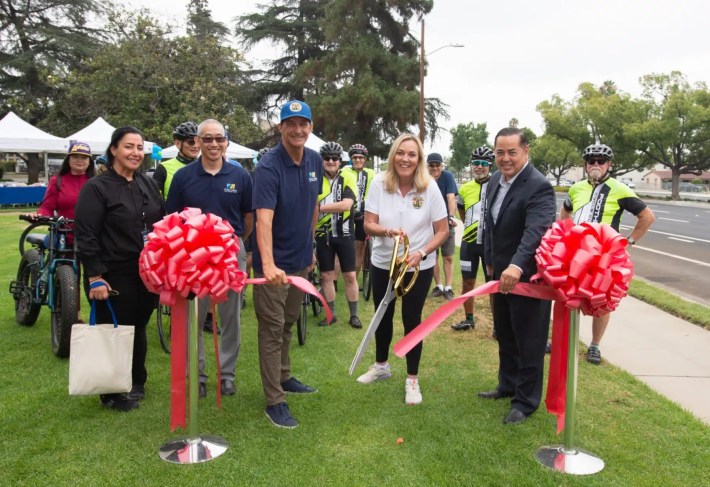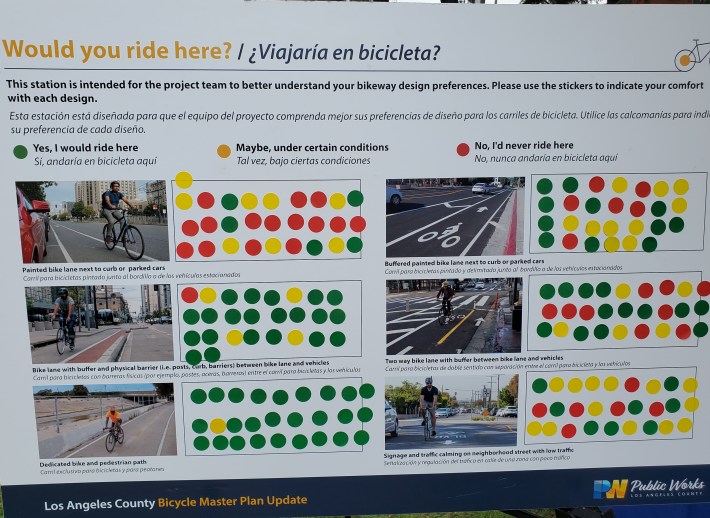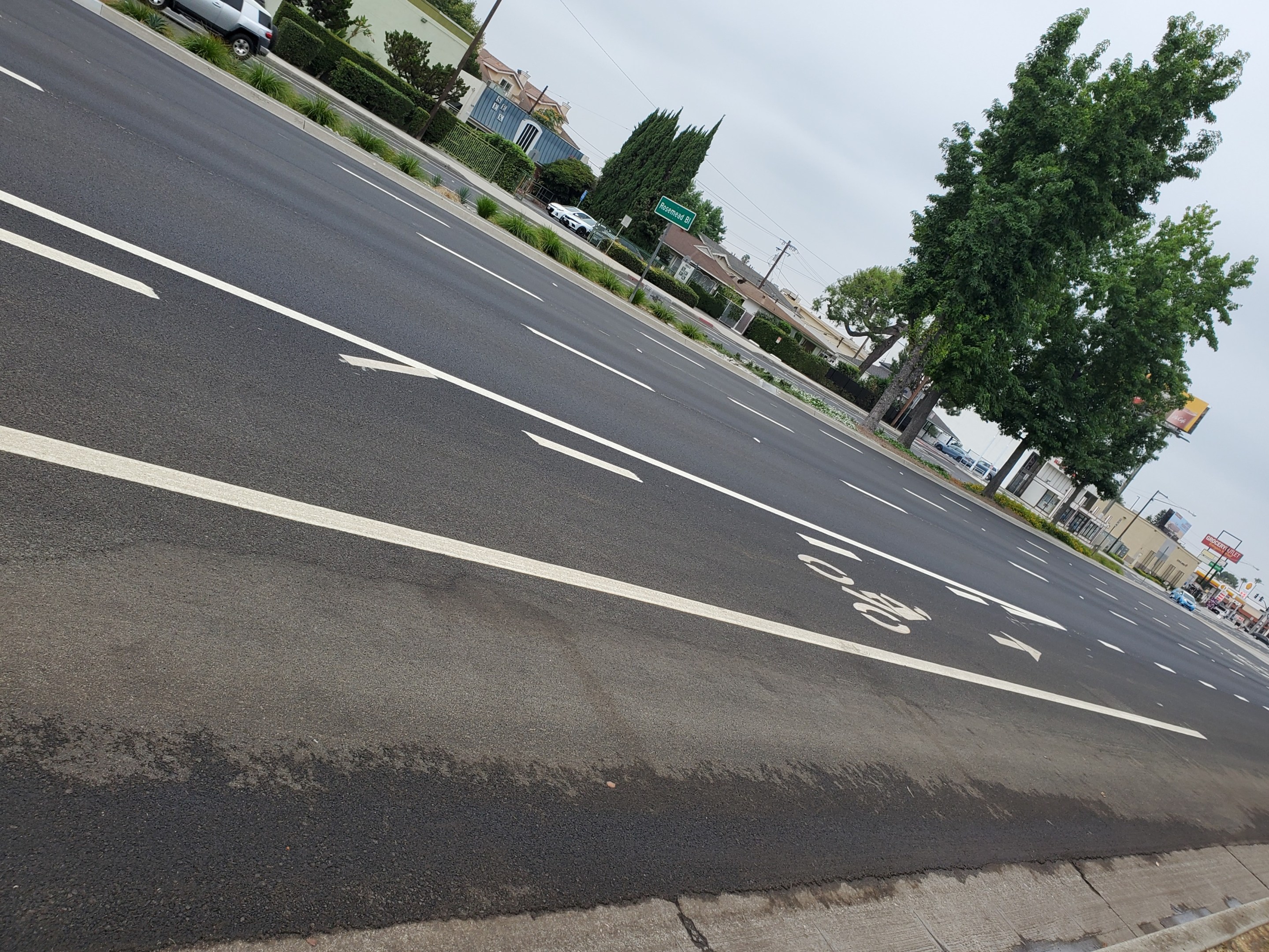On July 29, the New York Times published an article about the tragic death of an Encinitas teenager who was killed in traffic while riding an ebike. The Times was rightly taken to task for blaming the ebike rather than the driver of the vehicle that clipped him. Brodee Champlain was hit while he was riding on “a busy road with a 55-mile-per-hour limit.” The California Bicycle Coalition, in a joint statement with multiple advocacy groups statewide, pointed out that the real problem that leads to bicyclist injuries and fatalities is not ebikes, it’s road design that does not support or protect bicyclists and other vulnerable road users.
Last week, L.A. County Supervisor Kathryn Barger led a bike ride to celebrate the opening of a bike lane on Huntington Drive, part of an $8.9 million project.

Huntington is a wide, wide road. Eight lanes widening to eleven at intersections, plus on-street parking, and a landscaped median. An average of 15,000 cars travel on it every day. Drivers on Huntington routinely exceed the posted speed limit of 45 mph. On that brand new piece of bicycle infrastructure, only paint separates a person on a bicycle from exactly the type of hazard that killed the Encinitas teen. A pedestrian or cyclist interacting with a motor vehicle at a speed of 40 mph or above is very likely to be killed.
What if we had given up a lane to create a place for bicycles that is physically separated from all those speeding cars?
In 2014, the National Institute for Transportation and Communities at Portland State University did a comprehensive study of protected bike lanes. They found that the number of users of a bike lane nearly triples when there are separation elements like bollards, curbs, even posts. New or less experienced riders are more likely to use a separated lane. A more recent study showed that protected bike lanes increase safety for EVERYONE – because not only are cars separated from more vulnerable road users, but drivers are also going more slowly, so crashes involving only cars are less likely to cause injury or death.
There were plenty of voices raised in favor of a safer alternative on Huntington. Those voices included county staff who work on bike lanes, local constituents, and the nonprofit advocacy group ActiveSGV. A number of constituents in fact met with Supervisor Barger’s transportation deputy.
The Supervisor’s office did nothing to change the design. Instead, last Friday, the Supervisor rode her bike from her home in San Marino to Michillinda Park to cut the ribbon on a line of paint. In her remarks, she couldn’t bring herself to use the word “safer,” although County Public Works Director Mark Pestrella noted that every five days, someone dies on L.A. County streets, and that “people want safety.” Community member Darren Manibog actually said, “As a father, safety is my topmost concern.” I hope Mr. Manibog does not let any of his five kids ride on the new bike lane, since they won’t have a couple of County Sheriff’s vehicles to ride alongside them like the supervisor did. As a personal injury attorney, perhaps he can represent the families of any individuals who have a bad outcome while riding a bike on Huntington.
At the event, I asked a few of the engineers from the Public Works Department if they had considered putting up some posts, or anything else to separate people on bikes from speeding cars. “We don’t do that,” one told me. (Actually, they do.)
Hm, 15,000 cars a day. L.A. County's own Street Design Manual notes that that’s a volume that could be accommodated by one lane.
On their eastern end, the new striped bike lanes connect with similar striped bike lanes that the city of Arcadia installed a few years ago. That city doesn’t have a planning document addressing bicycle infrastructure, but they managed to do the bare minimum. L.A. County has a Bicycle Master Plan, last updated in 2012. Their vision is to “improve the safety of our streets” and “increase the number of biking and multimodal trips.”

In fact, outreach staff from the County had a booth at the bike lane opening with a poster showing different types of bicycle infrastructure. The photo showing a bike lane delineated only by paint had the most red dots next to it, showing the option that people were most reluctant to use.
The County’s Bicycle Plan is currently being updated. You can still make a comment in favor of more protected bike lanes, and share your personal experiences on the road.
The signs are all around us this summer. Every weather report, from across the world, reminds us that burning fossil fuels is killing the planet. But spending money on unsafe, inadequate bicycle (and pedestrian) facilities will only encourage the naysayers. “We put in a bike lane, but nobody uses it.” Of course not! No sensible person on a bicycle wants to risk their life riding inches from death or serious injury.
We KNOW how to make our roads safe for everyone, including people who aren’t in cars. The NACTO All Ages and Abilities standards (from the National Association of City Transportation Officials) should guide EVERY project.
Why do we love cars more than we love absolutely anything else? Our children, a livable planet, ourselves?
Liz Schiller was car-free for more than 15 years in cities other than L.A. These days, she walks, bikes, and drives in Pasadena and greater Los Angeles, and she volunteers with the Pasadena Complete Streets Coalition.






